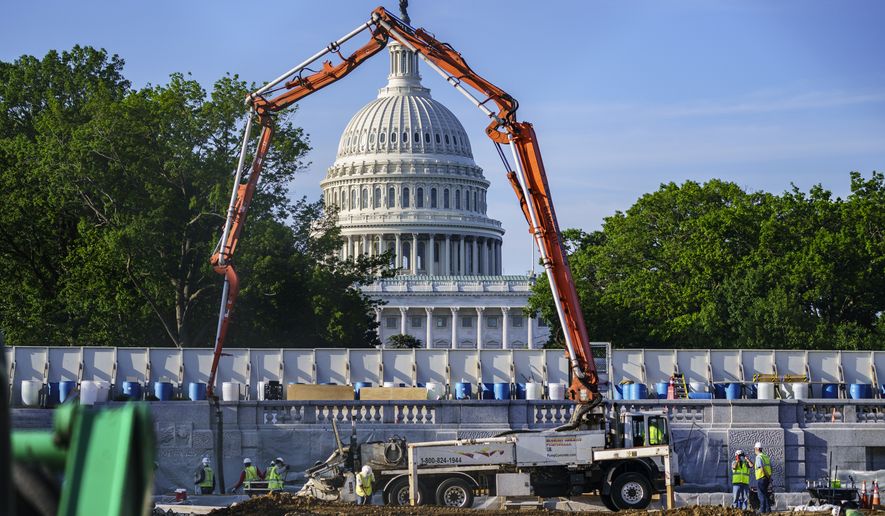Negotiations over President Biden’s massive infrastructure plan have hit a snag and the White House and congressional allies threatened Sunday to move toward a Democrat-only process if Republicans don’t acquiesce.
Cedric Richmond, a top adviser to Mr. Biden, said Sunday that the president is prepared to shift tactics on getting a substantial infrastructure package through Congress if Republicans don’t get on board.
“He will not let inaction be the answer and when it gets to the point where it looks like that is inevitable, you’ll see him change course,” Mr. Richmond, director of the Office of Public Engagement at the White House, said on CNN’s “State of the Union.” “But for now, we’re engaged in what we want to be a bipartisan infrastructure bill.”
Biden administration negotiators presented a $1.7 trillion infrastructure counteroffer late last week that trimmed some of Mr. Biden’s proposed money for broadband, roads and bridges but preserved the bulk of his original $2.3 trillion package.
Senate Republicans, who have offered their own $568 billion infrastructure proposal, didn’t rush to embrace the White House’s latest offer.
“I think we’re still pretty far apart,” Sen. Susan M. Collins, Maine Republican, said on ABC’s “This Week.” “But this is the test. This will determine whether or not we can work together in a bipartisan way on an important issue.”
SEE ALSO: Susan Collins GOP, Dems far apart on infrastructure deal
Ms. Collins said there are still disagreements on the definition of “infrastructure” and that Republicans don’t want to use the White House’s more expansive term that goes beyond roads, bridges and the like to shoehorn in spending on social programs like care for older adults.
Ms. Collins said a significant part of the White House’s counteroffer on Friday simply shifted some of Mr. Biden’s proposed spending into legislation already moving on Capitol Hill.
Sen. Shelley Moore Capito of West Virginia is running point for the Republican negotiators. Her office said the two groups remain far apart but that they would continue talking.
Mr. Biden must win support from more moderate senators like Ms. Collins as well, if the White House has any designs on winning 60 votes to thwart a possible filibuster in the Senate, which is evenly divided between 50 Democrats and 50 Republicans.
Democrats have effective control of the chamber thanks to Vice President Kamala Harris’ tie-breaking vote.
Sen. Roy Blunt, Missouri Republican, estimated that the negotiating parties have about 7-10 days to decide whether they can legitimately craft a bipartisan package.
“I’d like to. I believe the president would like to,” Mr. Blunt said on “Fox News Sunday.”
Mr. Blunt said the biggest point of disagreement isn’t the overall price tag, but rather the definition of the kinds of programs that should be included in an “infrastructure” package.
“The number is too big because the scope of what the White House staff wants to call ‘infrastructure’ is way too big,” he said.
The White House has targeted Memorial Day as a soft deadline to see some movement on the issue.
Senate Budget Committee Chairman Bernard Sanders said Sunday that Democrats will probably have to go it alone.
“That’s probably right, and I think that’s what the American people want,” Mr. Sanders, a Vermont independent who caucuses with Democrats, said on CBS’s “Face the Nation.”
“We would like bipartisanship, but I don’t think we have a seriousness on the part of the Republican leadership to address the major crises facing this country,” said Mr. Sanders, a self-described democratic socialist. “And if they’re not coming forward, we’ve got to go forward alone.”
If Democrats go it alone, Mr. Sanders will play a central role as budget committee chairman in helping unlock a fast-track tool that allows lawmakers to sidestep the 60-vote filibuster threshold.
Democrats used the tool, known as budget reconciliation, to pass Mr. Biden’s $1.9 trillion coronavirus relief package in March without a single Republican vote.
Even before the White House’s latest offer, liberal Democrats had already been getting antsy and pressing their leadership to start laying the groundwork for a Democrat-only process.
“People across America delivered Democrats … a clear mandate for transformative change,” said Rep. Pramila Jayapal, Washington Democrat and chairwoman of the Congressional Progressive Caucus. “Now, we must use this historic governing opportunity to go big, bold, and fast to deliver for them.”
Republicans had initially scoffed at Mr. Biden’s $2.25 trillion price tag, arguing the sum was extravagant in light of the recent debt the federal government has undertaken to pay for coronavirus relief.
Mr. Biden’s original package focuses heavily on “human infrastructure,” like money for job retraining and more public housing.
Only a small fraction of the president’s original proposal would go to fixing roads and bridges. The same plan, meanwhile, called for approximately $400 billion in funding for older adult care, among other priorities.
Republicans have also rejected the corporate tax increases Mr. Biden wants to pass to pay for part of the infrastructure package.
The White House says “user fee” funding mechanisms like a gas tax increase or a fee on electric vehicles, which Republicans have floated, could violate the president’s pledge not to increase taxes on people earning less than $400,000 per year.
• Haris Alic can be reached at halic@washingtontimes.com.
• David Sherfinski can be reached at dsherfinski@washingtontimes.com.




Please read our comment policy before commenting.